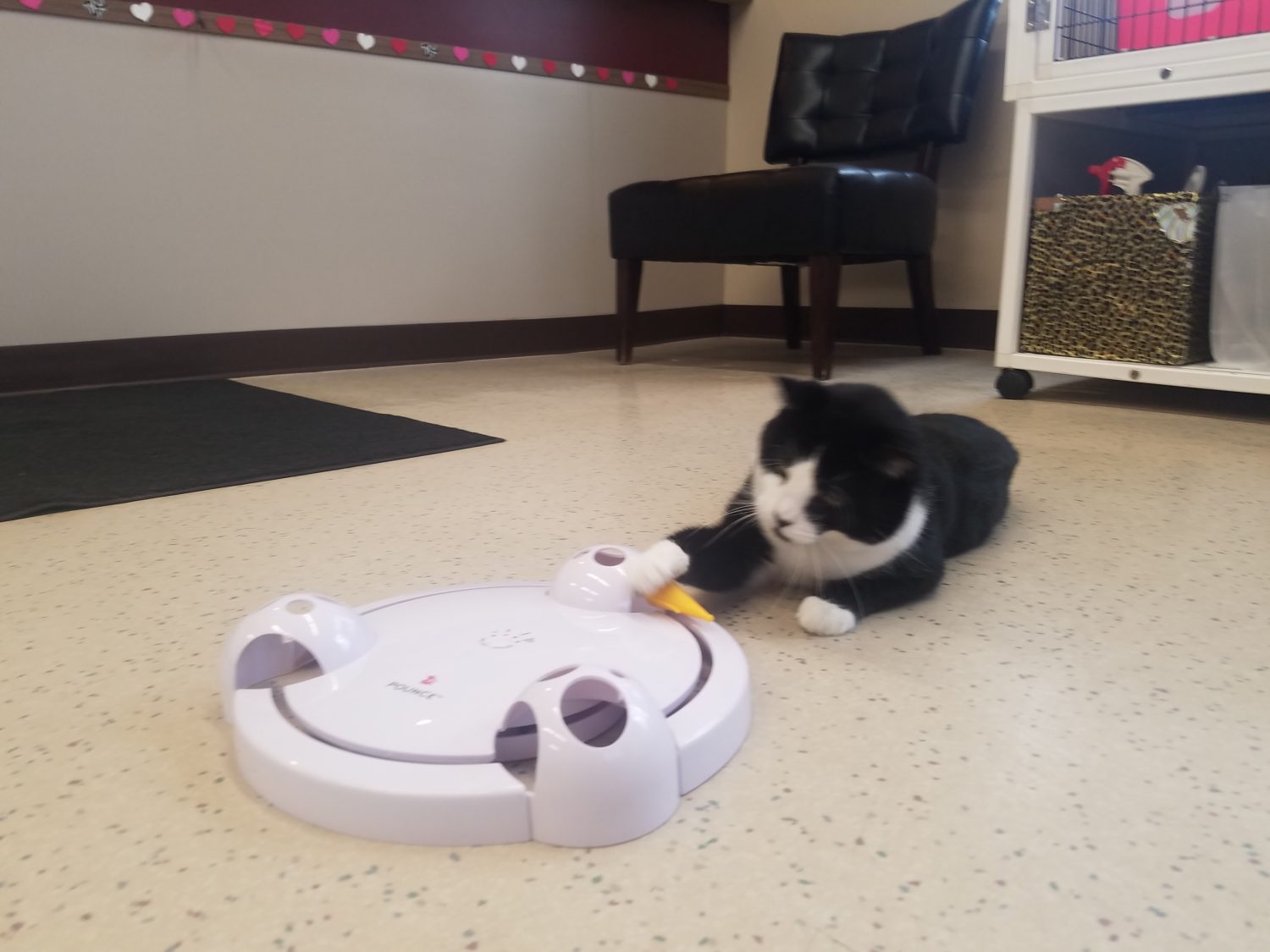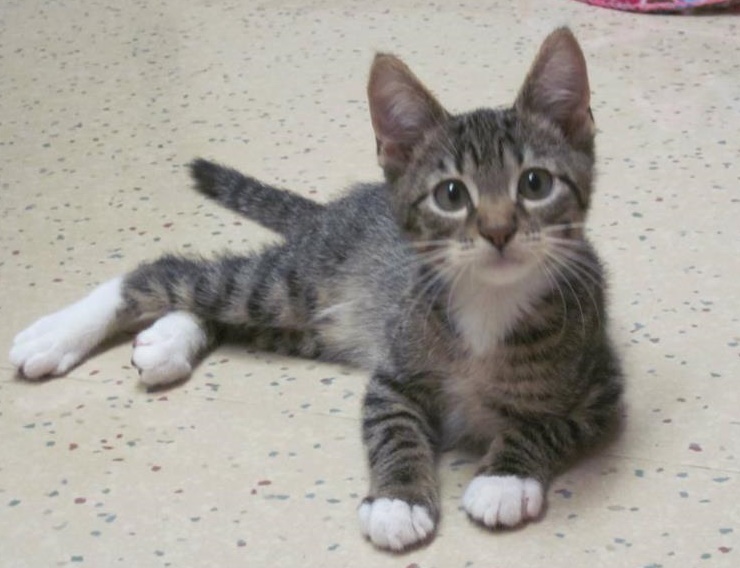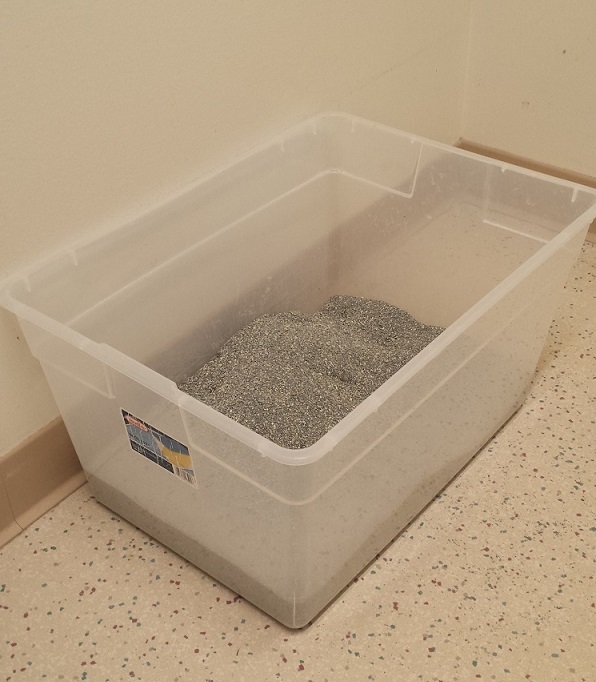Posts Tagged: cats
Does My Cat Need to See the Veterinarian?
How do you know if you furry feline is sick?
Cats are very good at hiding illness, especially in the early stages. Here are 7 subtle changes your cat may need to visit the veterinarian.
1. Inappropriate Elimination: If your cat is not using the litterbox, it is sure sign that something is wrong. Not using the litterbox can be due to a health problem like a urinary tract infection or a behavior problem, both of which your veterinarian can help you with.
2. Changes in Interactions/Activities: If your cat is typically a snuggly cat and suddenly does not want to anymore, it could be a n indication that your feline is in pain. While it is normal for your cat to slow down as he/she ages, this can be an indication of arthritis. Increased activity can also be an indication of a medical problem like hyperthyroidism.
n indication that your feline is in pain. While it is normal for your cat to slow down as he/she ages, this can be an indication of arthritis. Increased activity can also be an indication of a medical problem like hyperthyroidism.
3. Changes in Food/Water Consumption: Pay attention to how much your cat eats and drinks each day. If your feline’s appetite has decreased, it typically means something is wrong. Another thing to pay attention to is water intake. Many times increased water intake is an indication that something is wrong. If you are having trouble keeping track of your cat’s food and water intake, measure out the food and water given each day to keep track.
4.Weight Loss or Gain: A change in weight doesn’t always correlate with appetite changes. Cats that have hyperthyroidism or diabetes can lose weight even with a consistent appetite.
5. Changes in Grooming Habits: Cats are meticulous groomers. Changes in your feline’s coat include hair loss, greasy, dull looking, matting are all indications that something may be wrong.
6. Hiding/Sleeping Changes: Cats are social animals. They enjoy interacting with their human family and other pets. Changes in these interactions may be a result of an illness. It is normal for cats to sleep up to 16 hours each day. If this increases or deceases, it can also be a sign of illness.
7. Bad Breath: Did you know that over 70% of cats have dental disease by the age of 3? It is important to have you cat’s teeth checked at every exam. Bad breath is an early indicator of an oral problem.
Whether it’s routine or illness, we are here to help you get the best care possible for your feline companions. To set up an appointment, click here.
Microchip Your Pet: It Can Save Their Life
Is Your Pet Microchipped?
If the answer is “no” or “I am not sure”, now is the time to connect with us.

What Is A Microchip?
A microchip is a permanent form of identifcation for your pet. It is approximately the size of a grain of rice and is administered between your pet’s shoulder plades.
How Does It Work?
We never expect our kitty to sneak out the door as the kids are racing in and out of the house. We never expect our pooch to bolt when the fireworks go off. But it happens. If your furry family member gets out and is scooped up by animal control or brought into a vet clinic, they will scan him for a microchip. The microchip contains a unique identification code. This ID code is linked to your information. This allows you to be reunited with your pet fast!
Why Should I Have My Pet Microchipped?
One out of three pets will go missing in their lifetime. That’s scary. If your pet is microchipped, it increases the chances of being reunited by over 90%.
Do you know which day pets go missing the most? The 4th of July. That’s less than a month away.
I Want To Get My Pet Microchipped, What Now?
Set up an appointment with us and we can implant the chip. The cost of having the microchip implanted is $49.35.
To have the microchip registered, it typically costs $19.99. This month, we are covering the cost of registration for you!
Three Weird Cat Behaviors Explained
Our feline friends are wonderful companions, but they can also be curious critters when it comes to some of their behaviors. Here are three weird cat behaviors explained.
My Cat “Head Butts” Me.
 Does your kitty rub his face on you? This is also known as “head butting” Don’t worry, this is a good thing! This is his way of saying “hello, you are my people and I trust you”.
Does your kitty rub his face on you? This is also known as “head butting” Don’t worry, this is a good thing! This is his way of saying “hello, you are my people and I trust you”.
Cats have scent markers in their cheeks and they are rubbing their pheromones on you when they “head butt” you. This is just one of the many ways cats show their love for their humans.
My Cat Loves to Sit in Small Spaces.
 If you’ve visited our office, you have probably met our charismatic clinic cat “Wesley”. He is notorious for curling up in the recycle basket behind the front counter that is approximately one size too small to fit (what we would consider) Wesley comfortably. However, with all his soft, plush beds scattered throughout the clinic, he still prefers to curl up in the basket. So why does he prefer the small space?
If you’ve visited our office, you have probably met our charismatic clinic cat “Wesley”. He is notorious for curling up in the recycle basket behind the front counter that is approximately one size too small to fit (what we would consider) Wesley comfortably. However, with all his soft, plush beds scattered throughout the clinic, he still prefers to curl up in the basket. So why does he prefer the small space?
Small spaces actually help cats feel more safe and secure. This stems to when cats are in the wild, they aren’t going to take a nap in a big open space, are they? No, they are going to hide in an enclosed spot where they are hidden from any potential predators. So, when they curl up in a box or hide in a small space, it means they are finding themselves a safe, secure spot.
My Cat Sleeps All Day and Keeps Me Up All Night.

There’s nothing worse than when you are laying in bed at night just about to drift off to sleep and your cat decides to tear through the house like he’s chasing a ghost. Cats need exercise and stimulation throughout the day to ensure a restful sleep at night. Consider a cat food puzzle toy to make eating more of a game or challenge. Interactive toys, like a laser pointer or a Pounce toy are great ways to stimulate your cats body and mind. It’s easy to think a cat is a “self-sufficient” pet, but they want companionship from their human friends just as much as we do!
The Scoop on Litter Box Care
 Proper litter box care is an essential part of proper care for your feline friend. If your cat is eliminating outside of the litter box, this means there may have an underlying medical condition and you should take your feline to your veterinarian. If a medical condition is ruled out, there are many things you can do at home to make sure you have the right set up to ensure your cat will use the litter box.
Proper litter box care is an essential part of proper care for your feline friend. If your cat is eliminating outside of the litter box, this means there may have an underlying medical condition and you should take your feline to your veterinarian. If a medical condition is ruled out, there are many things you can do at home to make sure you have the right set up to ensure your cat will use the litter box.
How many litter boxes should I have?
The ideal number of litter boxes is one per cat, plus one. So if you have 2 cats, you should have three litter boxes. If you have 4 cats, you should have five litter boxes, and so on.
Where should I place my litter boxes?
Litter boxes should be placed in at least two different locations. If you have multiple levels in your home, consider placing a litter box on each level of the home. Locations should be private and have easy access. Avoid noisy appliances and doors that are opened frequently. Boxes should not be placed next to one another, as cats will only see this as one giant litter box.
What type of litter should I use?
Most cats prefer a fine-grained, unscented litter (e.g., clumping litter). Many cats prefer a litter depth of approximately 1.5 inches. Preference may vary by cat.
How often should I clean the litter box?
Boxes should be scooped 1-2 times daily. Litter should be completely changed once a week or more often if a multi-cat household. Wash litter box with warm, soapy water and dry well before adding new litter.

What kind of litter box should I buy?
Cats prefer litter boxes that are at least 1.5 times the length of their bodies. Commercial litter boxes are too small for larger cats! Sweater storage boxes, cement mixing tubs and small dog litter pans all make excellent cat litter boxes.
Are my cat’s potty habits normal?
The average cat urinates twice daily (+/- 2) and defecates once daily. Some will sniff and cover their eliminations; others don’t. Both are considered normal behavior.
Eliminating outside the box often signals an underlying medical condition. The earlier the problem is corrected, the better the chance for the cat to return to their litter box.
